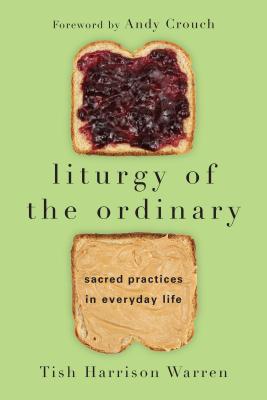
Review by Paula Vince
Many of us go through the day feeling like we don't have time for God. But God can become present to us in surprising ways through our everyday routines. Framed around one ordinary day, this book explores daily life through the lens of liturgy, small practices and habits that form us. Each chapter looks at something making the bed, brushing her teeth, losing her keys that the author does in the day. Drawing from the diversity of her life as a campus minister, Anglican priest, friend, wife, and mother, Tish Harrison Warren opens up a practical theology of the everyday. Each activity is related to a spiritual practice as well as an aspect of our Sunday worship. Come and discover the holiness of your every day.
MY THOUGHTS:
This book was just what I needed.
I love its emphasis on rhythms, routines, cycles, rituals, or whatever else we like to call those things we repeat over and over again. Our lives are full of daily, monthly, seasonal and annual repetition. Tish Harrison Warren sets out to explain how there's holiness and dignity in what we easily dismiss as mundane and tedious.
It's structured in the form of a random, typical day from her calendar, beginning with waking up and ending with going to sleep again. She presents fresh ways of thinking of all these moments, and I'll mention just a couple.
In the chapter on bed making, she describes how she used to begin each day checking emails and social media. (That looks very familiar, before my feet hit the floor.) Then she realised that she'd set herself up to expect stimulation and entertainment from the get-go. If you're like me, we're gently encouraged to welcome a bit of quiet sameness, and not to bolt away from mild boredom the moment we get a whiff of it.
There's a chapter on cleaning teeth and all those other mindless rituals which remind us that we're temples of the Holy Spirit. She delivers some good, straight talk here. Using our bodies for false worship is akin to using consecrated bread and wine in a Wiccan goddess ceremony. And denigrating our bodies by our mirrors is like running down a geographical sacred site. Yeah, sometimes we need of dose of this.
The 'Eating Leftovers' chapter leads to an interesting reflection that apart from occasional delicious feasts that wow our socks off, most of our home cooked meals are pretty basic, unremarkable fare, just like the grace of God appears to be. We've been conditioned in our modern era to want the spiritual intensity of meals cooked by celebrity chefs. People who attend church services and conferences are often longing for new truths, emotional experiences, signs and miracles. But life is just made up of good, nourishing food. If we are tempted to equate our scriptures with boring, dry old bread, well she advises us to just keep getting stuck into them anyway, because we'll develop a palate for the truth.
A chapter entitled 'Checking Emails' is about the attitude in which we approach our work. It's easy to be a Martha in our technology driven world, when work is always at hand. Or we can go to the opposite extreme and totally idolise the notion of complete escapism. Warren recommends something in the middle. We do our daily work from a relaxed, peaceful attitude of already being blessed, rather than a mad scramble to prove ourselves worthy. This will help combine the activity of Martha with the reflectiveness of Mary.
The other chapters are equally thought provoking. Losing the car keys, the pleasure of a cup of tea, getting stuck in traffic jams. It all brought home to me how much repetition we have to cope with, so we might as well make peace with it and consider all these routines to be sacred privileges, instead of grumbling about them and considering them to be annoyances. It's a book I'll be wanting to dip into more often just to remind myself.
Thanks to Net Galley and InterVarsity Press for my review copy.
5 stars
Paula Vince is a South Australian author of contemporary, inspirational fiction. She lives in the beautiful Adelaide Hills, with its four distinct seasons, and loves to use her environment as settings for her stories. Her novel, 'Picking up the Pieces' won the religious fiction section of the International Book Awards in 2011, and 'Best Forgotten' was winner of the CALEB prize the same year. She is also one of the four authors of 'The


Hi Paula, this book sounds like it takes after Brother Lawrence's book "The Practice of the Presence of God" (which is excellent) which reflects on similar principles: God is present in everything we do and are … so we just need to acknowledge Him and walk with Him as we go through our day.
ReplyDeleteThanks for sharing your review with us, Paula. A great way for us to start the year.
Hi Ian, it does remind me a bit of a 21st century take on 'The Practice of the Presence of God' and if I'm not mistaken, she refers to Brother Lawrence within the pages. And I agree with you, it is a good sort of theme with which to start a new year. I hope you have a great 2017.
DeleteSounds like something I need to read. Heading off to NetGalley ...
ReplyDelete